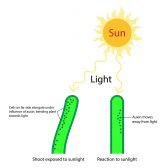Definition
noun
The branch of genetics that is concerned primarily in cellular components, especially chromosomes, in relation to heredity, genetic anomalies, and pathologic conditions
Supplement
Cytogenetics is a combination of cytology and genetics. Cytology deals with the study of cells, their origin, structure, function and pathology. It makes use of light or electron microscopic methods for the study of morphology, and as a means to diagnose or test for cancer and other diseases. Genetics deals primarily with the patterns of inheritance of specific traits. It aims to explain how traits are passed down from patent to offspring. It therefore studies heredity, genetic structure, gene function, and genetic variation. Cytogenetics is a branch of genetics. Other branches of genetics include molecular genetics, population genetics, medical genetics, developmental genetics, etc. Cytogenetics, in particular, studies the structure, number, and function of chromosomes in the cell in connection with heredity, genetic anomalies, and pathologic conditions. It is the branch of genetics that deal at the cellular level. The most common methods used are cytogenetic banding techniques, karyotyping, fluorescent in situ hybridization, and comparative genomic hybridization. The person that specializes in cytogenetics is called cytogeneticist.
Word origin: Ancient Greek kútos (receptacle) + génesis (origin)
Compare:
See also:
Related term(s):
- cytogeneticist







